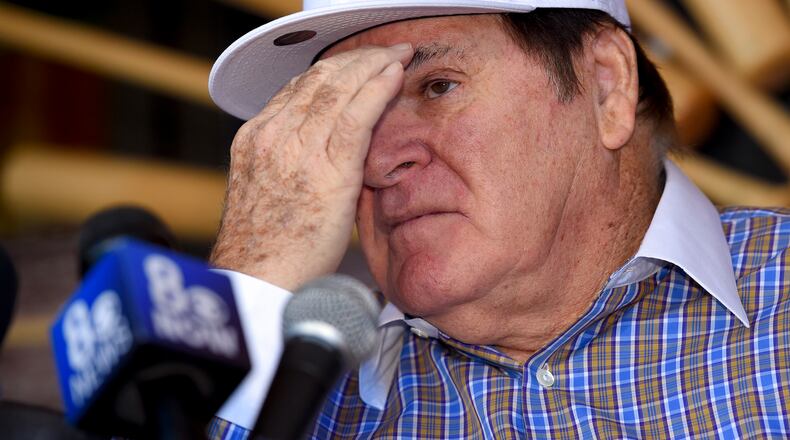Maybe it is time to parole Pete Rose.
By our ever-sliding scale of right and wrong – be that in sports or the wider, more important world – the man who bet on baseball is looking better every day.
He argues that in the 30 years since he agreed to an indefinite ban, other players have bloated themselves on performance enhancers. A World Series champion has taken sign-stealing to a nefarious extreme. And none of them have been judged as harshly as he.
How can I be worse than all the other liars and cheats who have come after me, he asks? His argument is hardly the most inspiring kind, hardly the stirring plea of the wrongly convicted. But it is the perfect argument for a time in which so much integrity is negotiable.
Rose just threw the Hail Mary of the scoundrel, claiming that his worst is no worse than the rest. Time to redraw baseball’s line in the sand concerning gambling. Time to forgive what was once unforgivable.
In a petition to MLB Commissioner Rob Manfred, Rose and his lawyer tried to cast the Hit King’s plight in a new perspective:
“It has never been suggested, let alone established, that any of Mr. Rose’s actions influenced the outcome of any game or the performance of any player. Yet for the 31st year and counting, he continues to suffer a punishment vastly disproportionate to those who have done just that. Given the manner in which Major League Baseball has treated and continues to treat other egregious assaults on the integrity of the game, Mr. Rose’s ongoing punishment is no longer justifiable as a proportional response to his transgressions.”
Baseball does not make it easy to continue to take the hard line on Rose. For the players who benefited from the sign-stealing scandal there has come no punishment. For the franchise – Houston – that won a World Series while employing institutionalized cheating, no suggestion that it might be stripped.
And on the topic of gambling, MLB gave up that high ground long ago in the search for other revenue streams. It even has an “official gaming partner,” in MGM Resorts.
At the time, it was no surprise that Rose was banished to the margins when it was determined he bet on baseball and on his own team as Cincinnati’s manager. Atop that were his continual denials, until finally coming clean around the time he published a book (and what better way to boost sales).
It’s right there on a sign in every major league clubhouse, which reads, in part: “Any player, umpire, or club or league official or employee, who shall bet any sum whatsoever upon any baseball game in connection with which the bettor has a duty to perform shall be declared permanently ineligible.”
So, what say we just relegate that sign to history as another quaint ideal with which the world can no longer be bothered?
What Rose is leaving us with now is a distasteful debate of what’s the greater threat to baseball, gambling or cheating. It’s like trying to rank the odors in a parking garage stairwell.
It is unlikely that this latest petition, the one that pokes at baseball’s conscience, will go anywhere. Reinstatement remains a long shot for Rose.
And even if Rose was to get himself on a Hall of Fame ballot – the ultimate goal of all this – the same voters who have excluded the suspected steroid users would exclude the confirmed bettor. He is not going to reach Cooperstown through that particular back-alley door.
Even those who never would have thought it proper to reinstate Rose have to be wavering now. If baseball lifts its ban, what’s really the harm?
In the bigger picture, the guy who bet on baseball will compare himself favorably to any of the game’s other miscreants. And that passes for vindication these days.
About the Author
The Latest
Featured



